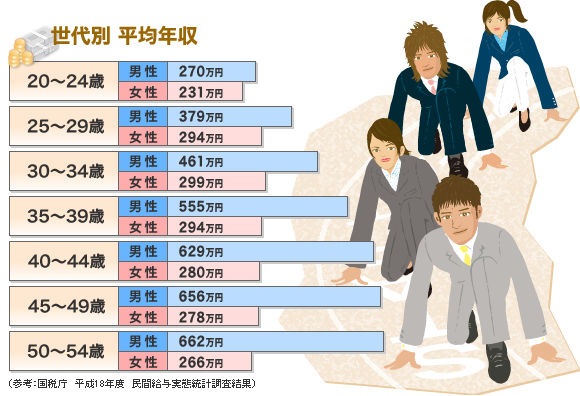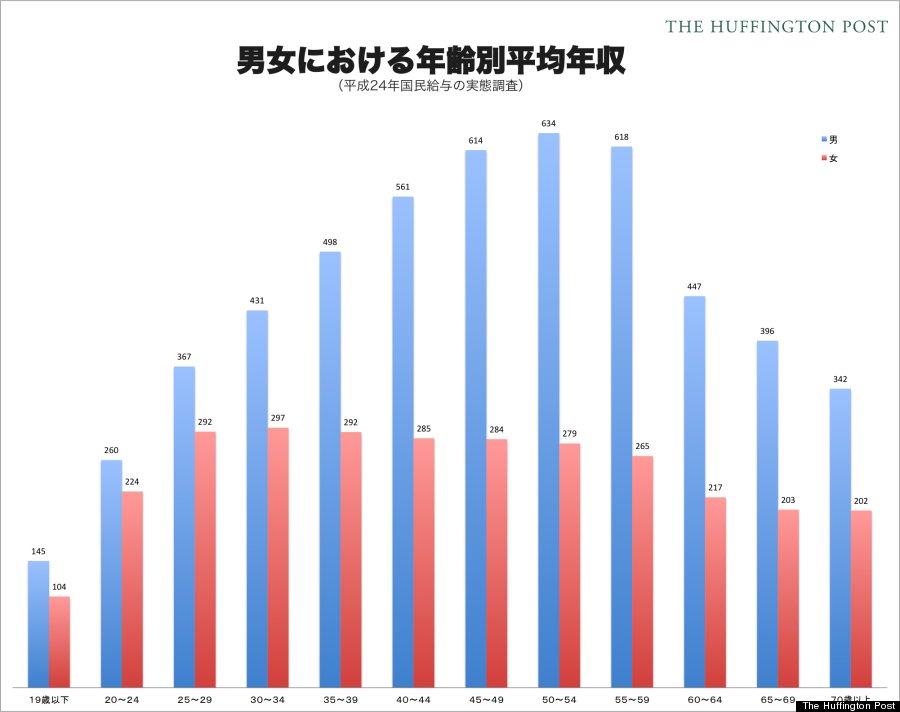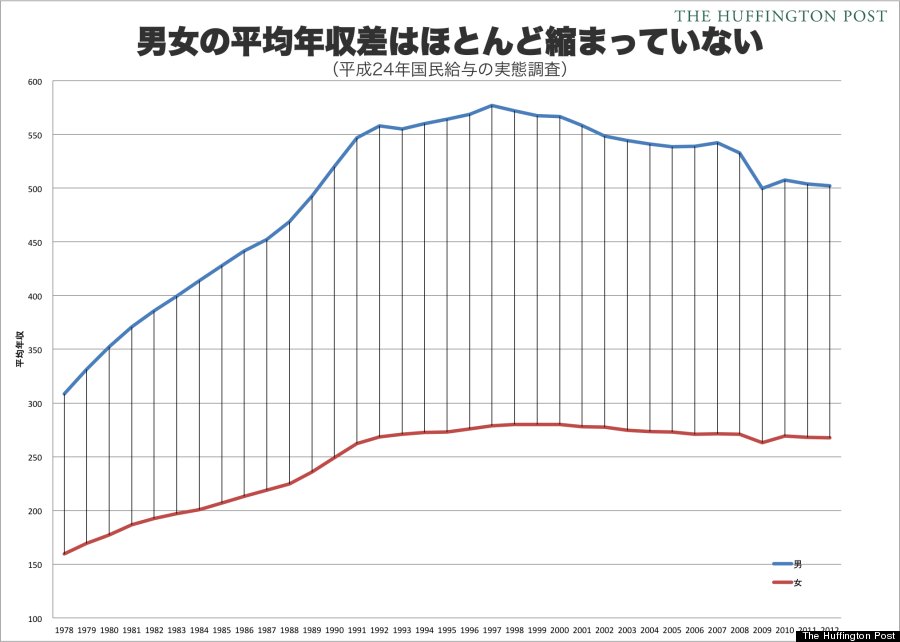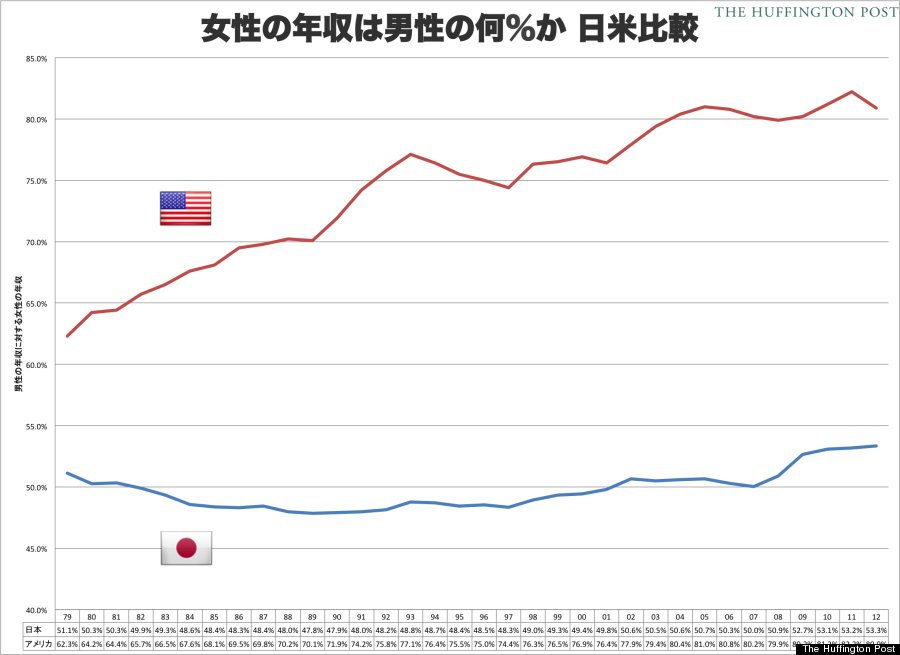The Shocking Truth About Women’s Salaries in Japan

As I was doing some random internet searching on average salaries across the world, I found a link for data on Japan. While the average, annual earnings of a 24-27 year old for your average Tokyo salaryman was alarming (27,000 USD/year), what shocked me even more was this:

For those that can’t read Japanese, the men’s salaries are listed in blue and the women’s are in pink.
While the pay increases for men as they age, the salary for women actually decreases. In Japan, women don’t even come close to earning as much as their male counterparts—in their entire lives. I knew the pay gap was quite atrocious in Japan, I had lived there and read enough research, but this bar graph was like being splashed with cold water. It’s that bad?
Ok, I thought. This data is from 2006—it’s a bit old. Let’s see if I can dig up something newer.
I came up with this recently published article from Japan’s Huffington Post with data from Japan’s Bureau of Labor, accurately titled as:
“Women’s Salaries in Japan are Far Too Low.”
See the 2012 statistics for yourself (again, men are in blue and women in red):

Wow. I don’t even need to explain anything.
Look at age brackets 45-54: Men are making triple the amount women are!
Just in case the bar graph wasn’t enough, they made a line graph for our viewing pleasure as well:

The following highlights American women’s earning as a percentage of men’s versus Japanese women’s earning as a percentage of Japanese men.

To put things into perspective: The Huffington Post article mentioned that American women are earning 80% of what American men earn, which is a huge leap from 1979 when it was only 62%.
Japanese women, however, only make 53.3% of what Japanese men make, which is a tiny skip up from 1979’s recording of 51%.
Among all the first world countries, Japan and Korea have the world’s largest gender wage gap. Japan ranks at 28% while Korea clocks in at 39%:
Gender Wage Gap By Country 2009

When it comes to Japan and all of its racist and sexist tendencies, it’s hard to shock me.
But this?
It was like an explosion in my brain.
But Why? Why Japan?
I can’t speak for Korea, but Japan’s economy is in the crapper. GDP shrunk almost 2% in half a year. They’re having elections in a week after going through a handful of prime ministers in the last five years. The yen is at the lowest it’s been in ten years—120 to the dollar—and it’s still falling.
And you know what could, perhaps, help the economy? Aside from slack on immigration laws and an overhaul to their archaic social and business system?
Encouraging women to work.
As the Economist posted in an article a few months back, it’s not that Japanese women are being held back from the workforce—they voluntarily leave the workforce. A survey last year showed that a third of very young women want to become full-time housewives.
Japanese companies require hours of overtime, post drinking parties on a daily basis, and basically a blood contract that says I will never miss a day of work and refuse to use my paid leave or take vacation.
If you had the choice of working to death as a salaryman or just staying at home while spending your husband’s hard earned paycheck, it’s no surprise Japanese women take the path of least resistance.
Even K once told me that Japanese women don’t want to work. They just want to get married.
And even if she did want to work, how could she work until 11 PM every night, attend drinking parties with her boss or participate in her child’s school play without using paid leave?
Simply, there is no wiggle room for a woman to juggle a family and a career in Japan.
To quote the Economist article, “When women have their first child, 70% of them stop working for a decade or more, compared with just 30% in America. Quite a lot of those 70% are gone for good.”
And the few that do somehow manage to balance career and family or push forward to make it in the business world are faced with rampant sexism and placed into “clerical” roles.
It’s no wonder one of my Japanese friends, a woman that started a wildly successful PR business in China, had to move to Shanghai to get anything done. Oh, let’s not forget that she wasn’t able to get married until 40 and had to find her Japanese husband in Shanghai (plus, she’s smoking hot and intelligent–I’d marry her).
Japan could stimulate its economy if half of its workforce—the women—were not only allowed, but encouraged, to participate in the workforce, bring their ideas to the table and actually play an active role in its economy. Prime Minister Abe is trying, but like so many things in Japan, it’s going to be a tough act to change.
PS: On a totally unrelated note, I found this really cool Global Wage calculator that is both enlightening and saddening. See how your pay scales out both domestically and abroad.
8 thoughts on “The Shocking Truth About Women’s Salaries in Japan”
I earn 0.00078 x of the Queen of England salary… hahaha.
I used to think Japanese and Korean women were too conservative and thus they didn’t want to work outside the house. But now I understand it… what is the point of breaking your back if just because you have boobs you earn 3 times less?
This calls for a revolution!
Haha, the Queen of England makes a lot of money for sitting in parades, waving to the people and wearing fancy outfits!
Yeah I think Japanese and Korean society is set up to create Stay at home Housewives. The only people that work harder than Japanese are the Koreans (I hear they just sleep in their office 70% of the time), so it makes sense. It’s funny how China, although so close to the two, is so different. I read a statistic somewhere that there’s more women higher management in China than anywhere else in the world (even beats USA). Makes sense, though… So many of the CEOs I met in Shanghai were women, and they were tough! It was refreshing!
P.S. According to that website the average annual salary in China is 28,752 RMB… 2,400 RMB a month. I knew it was something like that, but seeing it again… wow.
I know, doesn’t that blow your mind? How do they survive!?!?!
I think the average in Shanghai was about 7,000 RMB? My good friend in Shanghai has a masters in finance from England and speaks perfect English–and she only makes about 8,000… wages are tight in China!
That is another problem… what is the point of children spending their childhood and teenage years studying, without time for anything else, if that won’t secure them a better paying job? 8,000 is what my ex colleagues in Suzhou get (the department managers), and they don´t speak English and have never lived abroad. Some of them didn´t even go to college.
My bf told me once that in fact, the students who perform poorly in school and don´t go to class because they are out with their friends, etc, they end up creating their own businesses and earn much more than the hardworking students!
So, my conclusion is: let the children play and socialize!!
I mean, while this data is all true, I don’t think it’s a good idea to make absolute statements like “even if she did want to work, how could she work until 11 PM every night, attend drinking parties with her boss or participate in her child’s school play without using paid leave?” and “the few that do somehow manage to balance career and family or push forward to make it in the business world are faced with rampant sexism and placed into “clerical” roles.”
I work at a large game company in Tokyo, we have about 300-400 employees and a US branch. While there are a lot of rules, the company is relaxed in general and we can wear jeans and sneakers to work every day if we want. My manager is a woman and she has a 1-year-old child at home. She was chosen for a future promotion (to take place 5 months after she returned from maternity leave) while she was on maternity leave. She is on a special 9-to-5 schedule (the usual schedule for my company to 10-to-7) so she can go home to be with her son. Even if she stays late, it’s usually no later than 6. Her own manager is also a mother, and I believe she is also on the same early-leave schedule.
My company is not the type to have mandatory nomikai; we have one about once every 2-3 months. My manager doesn’t attend and it’s completely fine.
It’s not just this company. At my last company (also in Tokyo), a manager returned from maternity leave and her power was completely intact.
Yes, the “salaryman” work life image is one of the most prevalent, but it’s not the only one. Honestly, part of the “work until 11, then go out drinking with the boss” stereotype feels stuck in the 80s and 90s. Some things are changing, slowly but surely.
Yes, your stats are true. Women are mostly working in keiyaku shain positions where wages are flat. They are hostage to this scheme because if they quit, they cant find another job easily. They are also barred from allot of jobs that J men can do, but so are gaijin. Women are a step up on the caste ladder, for the most part, than gaijin, who are the very bottom.
Women over 40 get hit hard; many end up working in service industries like hotel bedmakers or waiters, etc.
This is supposedly changing due to Abenomics reform efforts, but we cant see much of it producing any noticeable change. You occasionally see women truck drivers though. I see them in construction now as well.
This might explain allot of the negativity and gossip you get from older women, stuck in a dead end life. Some of them are quite evil, there only purpose in life is to make somebody miserable, because its all they have known.
Japan does its own people no justice. Companies hoard trillions of rather than give jobs to immigrants and J women or even a modest pay hike.